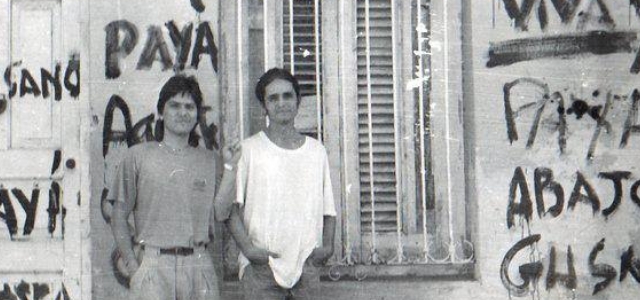
Already a year has passed since the attack on Oswaldo Paya and Harold Cepero carried out by a car of the Cuban State Security. It was just one of the cars that had been chasing them since the early hours of July 22 with the intent to stop them, trying to prevent history from taking its course, make it impossible for the powerless to regain their right to exercise freedom and pursue happiness.
The regime knew it. All of them had known it for long. They knew that Oswaldo Paya would not settle for the government’s make-believe changes, they knew that he would pursue his cause at all cost, that he would insist that all rights of all Cubans be recognized.
Oswaldo Paya wasn’t a bawler. He wasn’t a prophet. His value consisted in his serenity and consistency, qualities which had led him to become a martyr. Both his work and the way he resisted tyranny was in line with the legacy of the Cuban priest Felix Varela and the intellectual Jose Marti. Paya’s humanity was of the kind that was also inherent to his close friend Václav Havel as well as to Martin Luther King and Mahatma Gandhi.
It was in the late eighties when I first met Paya – a young man who had already had first-hand experience with punishment for staying true to his beliefs and ideals. In 1969 he was sent to a forced labor camp on account of making a public protest against the invasion in Czechoslovakia carried out by Soviet Union and its Warsaw Pact allies. However, the three long years suffered in the labor camp didn’t break Paya’s free spirit.
We got our own share of repression before we grew up just because of our music preferences. We listened to songs by Rolling Stones, Black Sabbath, Led Zeppelin, Kiss or White Snake, groups popular with young people elsewhere in the world. In Cuba, however, this kind of music was considered “ideological deviation” and the regime spared no efforts to destroy our small groups of young, disobedient rebels, who dared to stand up to the repressive forces. We wanted to show that we are different from the generation that had succumbed to the official ideology and had become integrated in it. It was under these circumstances when I first met Oswaldo Paya.
We were a group of young people, for whom everything would change since then. The whole history changed. A civilian movement was established in order to begin a peaceful struggle to return sovereignty to the people. For the first time in history, there was a movement that didn’t intend to speak for those who weren’t heard but wanted to give floor to the individual. It sought to create space for opinions of the powerless. A movement that would constantly demand freedom and pave the road to a sincere and free dialogue that would reconcile the Cubans. After assessing its 25-year struggle, it can be concluded that the impact of the Christian Liberation Movement, an organization founded by Paya, his wife and a group of lay Catholics, is tangible and significant. Its authentic and consistent endeavor has not been paralyzed by any repressive acts against the leaders of the group of regime opponents led by Oswaldo Paya, nor by their imprisonment, expatriation or assassination. Thousands of Cubans are still committed to Paya’s cause and are determined to hold on until the end.
Nobody can ever assess the significance of the physical loss of Oswaldo Paya. If he had lived, he would have become an important figure in the future of Cuba because he, like thousands of other Cubans, had been working on it. His family has lost a good and caring father and a loving husband. We, his friends, have lost our leader, our dear brother. Cuba has lost its chance to accelerate the pursuit of freedom, its opportunity to finish with fraud and opportunism and prevent these evils from growing stronger, as we can see today.
Yet, the eye of the bully won’t find peace – the perpetrator will be troubled by its conscience, burdened by the guilt of the crime. The complicity of opportunists will not let them feel superior to the victim, neither will the silence of cowards make them feel freer. They will have to live with what they have done forever.
We will continue with the struggle initiated half a century ago. We can rely on brave men and women both from Cuba and abroad, who are committed to the legacy left by Oswaldo Paya and Harold Cepero. We will never cease trying to find the truth about the crime and we will always carry our friends in our grateful hearts.
Despite being in tears now, Cuba will be born again: a free country that will always honor its slain children.

Leave a comment